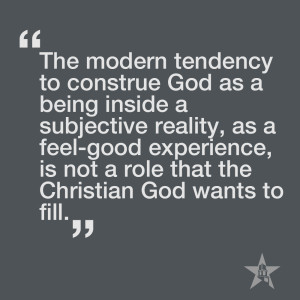Every week Gillette puts up a new devotional in the shower for their residents to read. I look forward to these devotionals and am encouraged to hear a new tone in the writings. Last year I was beginning to see common trends in the devotionals that I found somewhat disheartening. The basic framework to the majority of these devotionals consisted of negative self-talk and God as remedy to this negativity. The devotions, more often than not, understood God as a source of alleviation from day-to-day struggles and pains and saw Him as a reminder to live, think and act more positively. These thoughts or concepts are not wrong, in fact they can be very good, but the commonality of understanding God this way points to a deeper issue.
 This cycle, although not as evident on campus (so far) is a common way people tend to express their relationship to God. I find this troubling, because it means that people most commonly relate to God not in the spirit of love, but insecurity. This is bound to happen to some degree. We are finite beings and God is infinite, it is only natural and good to go to Him for refuge. That being said, spiritualizing these insecurities and remaining hyper-sensitive to the pains of existence can deeply shape how one interacts with God. One may deeply love God, but reflection on His truths will be tainted by a desire to feel relieved of frustrating grievances.
This cycle, although not as evident on campus (so far) is a common way people tend to express their relationship to God. I find this troubling, because it means that people most commonly relate to God not in the spirit of love, but insecurity. This is bound to happen to some degree. We are finite beings and God is infinite, it is only natural and good to go to Him for refuge. That being said, spiritualizing these insecurities and remaining hyper-sensitive to the pains of existence can deeply shape how one interacts with God. One may deeply love God, but reflection on His truths will be tainted by a desire to feel relieved of frustrating grievances.
I am deeply skeptical that this kind of reflection brings lasting peace. God undoubtedly involves human beings in His affairs. The Bible is filled with narratives in which God works through men and women to accomplish His purposes. Emotion is also a part of worship and relationship. The Bible contains writings where individuals, such as David, Jeremiah and Habbukuk, communicate to God using their emotional faculties. The problem does not rest purely in emotion, but the tendency to resort to emotionalism. The problem arises when one’s definition of God is inextricably linked to their emotional experiences. When this definition is used as a starting point the God of the universe is reduced to a being whose prime purpose is to supplement His creation’s emotional health. God becomes a coping mechanism and the art of theology and the pursuit to understand God as an independent and perfect identity is polluted.
 It is incredibly easy to spiritualize emotionalism and yet the Christian faith encourages us to look outside ourselves. The Christian faith understands God as a personal and loving parent-figure. The bible has no problem acknowledging that God is our helper in the times of need– and yet God is much more. The modern tendency to construe God as a being inside a subjective reality, as a feel-good experience, is not a role that the Christian God wants to fill. Rather, Christ wants objective authority and He invites His followers to worship His divinity with this sense of reverence.
It is incredibly easy to spiritualize emotionalism and yet the Christian faith encourages us to look outside ourselves. The Christian faith understands God as a personal and loving parent-figure. The bible has no problem acknowledging that God is our helper in the times of need– and yet God is much more. The modern tendency to construe God as a being inside a subjective reality, as a feel-good experience, is not a role that the Christian God wants to fill. Rather, Christ wants objective authority and He invites His followers to worship His divinity with this sense of reverence.
As followers of Christ we do not relate to God on the basis of our insecurity or personal dilemma, but on the knowledge that He is God. This act of knowing God is what opens us to the faculties of personal and perfect love and it is the knowledge of perfect love that erodes the fear and anxieties that so deeply entrench our personal conflicts and lives. I am incredibly encouraged by Luke Rosamilia’s opinion piece last week and the Gillette shower devotions thus far, because I see it as evidence of Houghton students who recognize the temptation to interpret God purely through their emotions and are choosing to have a holistic concept of who God is to us and who God is in His being– and I’m confident that this type of reflection will bring peace.
